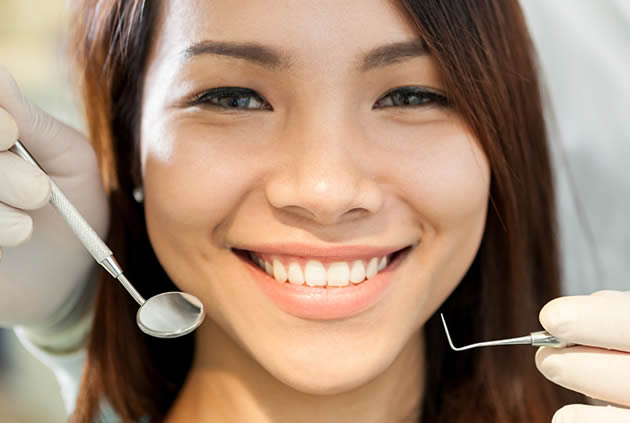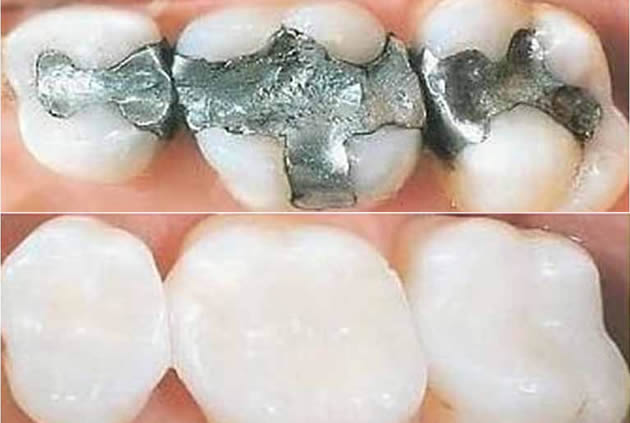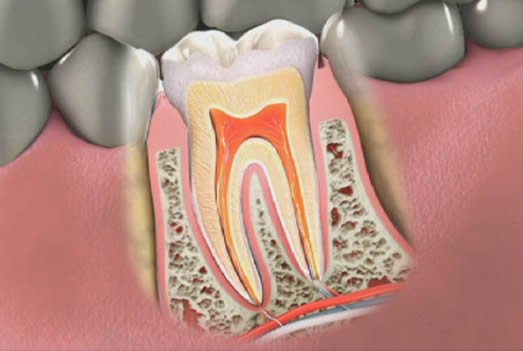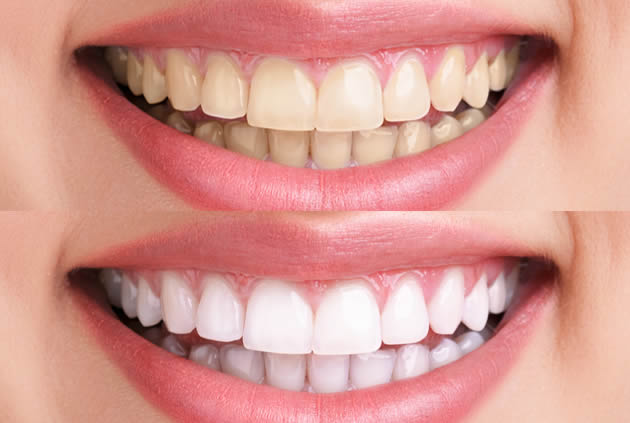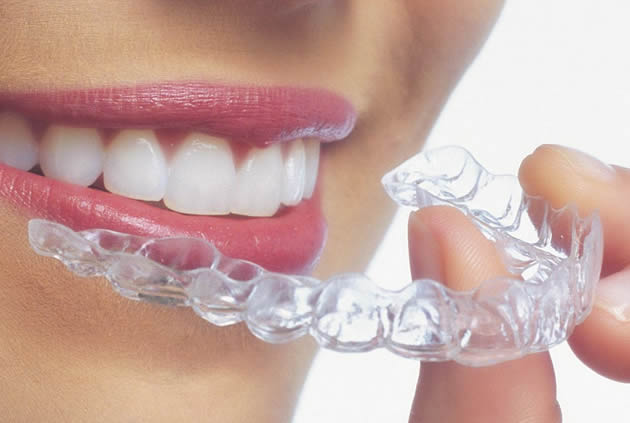
- Importance of dental health
When most people think about their health, they often overlook the importance of their dental health. However, good oral hygiene not only prevents tooth decay and gum disease, it also contributes to overall well-being.
Poor oral hygiene can lead to an array of health problems such as heart disease, diabetes, dementia and even pregnancy complications. Therefore, taking care of your teeth and gums is essential for a healthy body.
Role of general dentists in maintaining dental health
General dentists play a vital role in helping maintain optimal oral health by providing preventative care services such as cleanings and check-ups. These regular visits allow your dentist to take preventative measures that may help detect small issues before they become serious problems. Your dentist can identify early warning signs such as cavities or gum disease so that you can take action before they develop into more significant issues.
Additionally, your dentist will educate you on how to take care of your teeth at home and provide valuable advice on lifestyle choices that impact oral health. All in all, regular visits to the general dentist are critical for maintaining healthy teeth and gums long-term.
Preventative Care
Regular Cleanings and Check-ups
Keeping up with regular dental cleanings and check-ups is essential for maintaining healthy teeth and gums. During these appointments, your dentist will thoroughly clean your teeth, removing any plaque or tartar buildup that has accumulated since your last visit.
They will also perform a comprehensive exam to check for any signs of tooth decay, gum disease, or other potential issues. By visiting the dentist every six months, you can help prevent small problems from becoming larger and more expensive ones down the road.
Early Detection and Prevention of Dental Issues
During your dental appointments, your dentist will be able to identify any potential issues early on before they become serious problems. This includes identifying cavities in their early stages or recognizing signs of gum disease before it progresses too far. Early detection enables you to receive treatment sooner, usually resulting in less invasive procedures and lower treatment costs.
Furthermore, regular preventive care can help you avoid painful toothaches or emergencies that require immediate attention. Overall, preventive care through regular visits to the dentist is crucial for maintaining good oral health.
Not only does it ensure that your teeth are clean and healthy but also prevents more serious issues from developing later on down the line. So make sure to keep up with those six-month checkups!
Oral Health Education
Tips for at-home care:
As important as it is to visit your general dentist regularly, it is equally important to maintain good oral hygiene practices on your own. Brushing and flossing your teeth twice a day is a must, but there are tips and tricks that can help optimize your dental routine.
For instance, make sure you are using the right kind of toothbrush (soft-bristled is best) and change it every three months or after any illness. Electric toothbrushes can be helpful too, as they are designed to remove more plaque than manual brushing.
Flossing should not be neglected either – it removes food particles from between teeth and beneath the gum line. Mouthwash can also be a valuable addition to your routine and helps kill bacteria that brushing alone might miss.
Advice on diet and lifestyle choices that impact oral health:
There are many lifestyle choices that can affect oral health in significant ways. For example, smoking tobacco products puts you at risk for gum disease and tooth loss. Chewing tobacco products also increase the risk of developing oral cancers.
Additionally, high sugar consumption weakens tooth enamel over time and contributes to the formation of cavities; acidic foods such as citrus fruits can also have this effect by eroding enamel directly. Try incorporating more fiber-rich foods like fruits, vegetables, nuts, beans into your diet – they stimulate saliva production which helps wash away harmful bacteria in the mouth while neutralizing acids produced by plaque buildup on teeth surfaces.
Avoid grinding or clenching your teeth which could lead to cracks or fractures in them – stress management techniques like meditation or yoga could help reduce these habits if you have them. Remember: healthy habits at home will only complement the benefits of seeing a general dentist regularly!
Treatment of Dental Issues
Fillings – Root Canals – Extractions
Many people think that regular dental check-ups are only important for maintaining healthy teeth and gums. However, another vital reason to see your general dentist regularly is to address dental issues promptly. When left untreated, dental issues such as cavities can quickly become more severe and require more invasive procedures to correct.
If you have a cavity or decay in a tooth that has not yet reached the root or nerve, your dentist will most likely recommend filling the tooth. A simple procedure involving removing the decayed portion of the tooth and filling it with a composite material designed to match your natural tooth color.
If you have an infected or abscessed tooth that has reached the nerve, your dentist may recommend a root canal procedure. This involves removing the damaged portion of the tooth’s pulp and nerves and filling it with a sealant material.
In some cases where damage is too severe or a tooth is impacted, extraction may be necessary. It’s important to address these issues promptly as they can often lead to further complications if left unchecked.
Cosmetic Dentistry Services
A Brighter Smile: The Benefits of Teeth Whitening
Are you tired of feeling self-conscious about your smile? Do you want to boost your confidence and feel more comfortable showing off your teeth?
Teeth whitening may be the perfect solution for you! This cosmetic dentistry service is a simple and effective way to brighten up your smile and remove discoloration caused by factors like coffee, tea, wine, tobacco use, or aging.
Your general dentist will typically offer several different options for teeth whitening, including in-office treatments or take-home kits. No matter which option you choose, the results will be noticeable and can last for months with proper care.
Transforming Your Smile: The Magic of Veneers
If you’re looking for a more dramatic transformation of your smile, veneers might be just what you need! These thin shells are custom-made to fit over your existing teeth, covering imperfections like chips, stains, gaps or misalignment. Veneers are made from durable materials that look and feel just like natural teeth so that no one will know you have them on!
They can also provide additional strength to weakened teeth or protect them from further damage. Talk to your general dentist today about whether veneers would be the right choice for enhancing the appearance of your smile.
Feeling Confident with a Healthy Smile
Cosmetic dentistry services like teeth whitening and veneers aren’t just about looks- they can have a significant impact on how confident you feel in social situations. Having a healthy-looking smile can make all the difference in how others perceive us and how we perceive ourselves. A beautiful smile can make us feel more attractive, approachable, and happy- leading to improved self-esteem and overall well-being.
So why not invest in yourself by visiting your general dentist and exploring the options for cosmetic dentistry services that are available to you? You deserve to feel great about your smile!
Schedule an Appointment
Regular visits to the dentist are essential for maintaining good oral health, which is an integral part of overall health and wellness. By visiting your general dentist regularly, you can prevent dental problems from developing or catch them in their early stages.
Regular cleanings and check-ups can help detect issues like gum disease or cavities before they cause more significant problems. Your dentist can also provide tips on at-home oral care and lifestyle choices that impact your teeth and gums.
In addition to preventative care, regular visits to the dentist may also include treatment of dental issues such as fillings, root canals, extractions, and other services related to cosmetic dentistry. Your general dentist may also refer you to specialists when necessary for more specialized services like orthodontics or periodontics.
By making regular visits to the dentist a part of your self-care routine, you’ll be taking an important step towards maintaining a healthy smile that boosts not only your physical well-being but your confidence as well. So do yourself a favor—pick up the phone today and schedule your next appointment with your general dentist!
Do you live in Baltimore or the surrounding area? Our team is ready to help you achieve your smile goals. Schedule your appointment today.

When you visit the dentist, you often see other professionals in the office. Usually, the dentist will have a hygienist and a dental assistant as part of the team. While their roles aren’t the same as the dentist’s job, these individuals do play an important part in your dental care. Understanding what the hygienist and dental assistant do can make you feel more comfortable at your dental appointments.
The Dental Assistant
To become a dental assistant, an individual usually completes course work through a community college or technical school. This training will provide hands-on experience before the dental assistant works in an actual dental practice. A dental assistant can serve many functions, including assisting the dentist during treatment, taking impressions, sterilizing instruments, and making temporary crowns for patients. Dental assistants also welcome patients and help them feel comfortable in the dental office.
The Dental Hygienist
At a minimum, a dental hygienist must earn an associate’s degree, though many hygienists choose to obtain four-year degrees. Additionally, hygienists must be licensed in the states where they practice. The dental hygienist is generally responsible for taking patient x-rays, performing an initial periodontal assessment, and cleaning your teeth. During your appointment, the hygienist will also offer tips on home hygiene to help you maximize your oral car routine. A dental hygienist may also perform deep cleanings for gum disease, apply fluoride, remove sutures, and administer local anesthetic.

Your body is a little bit like a puzzle. It gives you clues to help you figure out what’s going on within your body. Did you know your mouth can give you hints about things that may be happening elsewhere in your body? Here’s a list of some of the signs your mouth can give you to pay attention to certain other aspects of your health.
Worn teeth and headache
If your teeth are showing extensive wear, you may be grinding your teeth. This would be even a stronger possibility if you’re also experiencing regular headaches, which can be caused by the muscle tension related to teeth grinding. This condition also indicates that you are likely under too much stress, and that you are unconsciously coping with it by grinding your teeth.
Gums covering teeth
If your gums begin to grow over your teeth and you are on medication, it may mean that your medication is at fault. Some medicines can cause your gums to overgrow, and the dosage needs to be adjusted.
Mouth sores
An open sore in your mouth that doesn’t go away in a couple of weeks can be an indicator of oral cancer. Numbness and unexplained bleeding in your mouth are other signs. Smokers and people over age 60 are at the most risk, but that doesn’t mean it doesn’t affect others too. See your dentist to make sure all is okay.
Cracked teeth
If your teeth begin to crack or wear extensively, you may have gastroesophogeal reflux disease (GERD). It’s a digestive disease that allows stomach acid to flow back into your food pipe and mouth. This acid can cause your teeth to deteriorate. Additional signs of GERD are acid reflux, heartburn, and dry mouth.
Unclean dentures
If you wear dentures, make sure you remove and clean them regularly. Inhaling food debris from your dentures that makes its way to your lungs can lead to pneum

Fun in the summer sun can cause unpleasant side effects such as cold sores and fever blisters. Brought on by herpes simplex virus type 1 (HSV-1), cold sores and fever blisters are transmitted from person to person by saliva or by skin contact. With cold sores, you generally develop clusters of tiny blisters on the lip. Most people are exposed to HSV-1 before age 10. After the first infection, the virus remains inactive until stress, illness, or sun exposure causes a new outbreak.
During the first exposure, you may have headache, nausea, fever, and/or vomiting. Patients may also have painful swelling and open mouth sores. Most of the time, cold sores or fever blisters appear on the edges of your lips. Usually, these outbreaks start with tingling or burning followed by swelling or redness. One or more blisters will typically appear within 24 to 48 hours.
Initial symptoms can last for 7 to 14 days. When the cold sores or blisters reappear, they generally crust over in about four days and then heal within 10 days. You may want to visit your doctor or dentist the first time you develop cold sores or fever blisters, but after that, you shouldn’t need medical attention. Keep the area clean and apply topical medication to lessen symptoms as well as promote healing.
Preventing a first infection for loved ones involves making sure that no one with an active fever blister kisses your kids or other family members. Sunscreen can help protect your lips from cold sores brought on by too much time in the sun.
Dentist in Baltimore
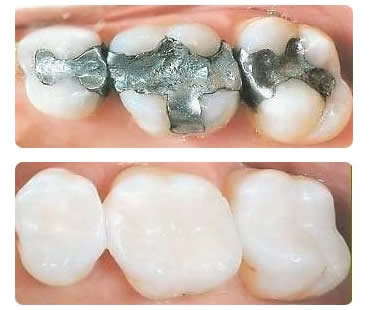
At one time, metal fillings were the only choice to repair tooth decay. Now, many dentists have switched to composite resin fillings, which match natural-tooth color so they don’t compromise the appearance of your smile. Tooth-colored fillings have gained popularity, and many dentists only offer this option. In recent years, there has been a strong push to eliminate amalgam fillings all together.
Amalgam fillings are made of several metals, with up to a 50 percent composition of mercury. It is widely known that mercury is toxic to the body. Some of the concern about amalgam fillings is the affect mercury has on the body, including:
• Causing damage to the kidneys
• Contributing to infertility
• Impacting the nervous system
• Interfering with the function of the thyroid and pituitary glands
• Posing unknown risk to a fetus
• Weakening the immune system
Because each person is different, you may have no reaction to the amalgam fillings. Over time, though, these restorations may change shape or crack, which can cause them to leak. If the fillings don’t hold up, the area may become susceptible to additional damage or decay.
At your checkup, have the dentist evaluate any old fillings to make sure they are still in good condition. You can also discuss the benefits of replacing amalgams with composite fillings. The newer restorations blend with your natural tooth coloring and require less removal of health tooth structure, which allows for a more conservative repair.
If you need a dentist in Baltimore contact us today

At some point in our lives, we’ve all experienced anxiety over visiting the dentist.
While it’s perfectly normal to feel apprehensive about dental procedures, fear and anxiety can sometimes prevent people from seeking necessary preventive or restorative dental care. In this article, we’ll explore some common fears associated with general dentistry and provide tips on how to overcome them.
The Importance of Dental Health
Dental health plays a crucial role in our overall well-being. Poor oral health can lead to various health problems such as gum disease, cavities, bad breath, and even heart disease or stroke.
Regular dental check-ups and cleanings are an essential part of maintaining good oral health. However, fear of the dentist can often prevent individuals from seeking these services regularly.
Common Fears Associated with General Dentistry
One common fear that many patients experience when visiting their dentist is a fear of pain. The thought of needles and drilling can cause anxiety for many individuals.
Additionally, some people may be fearful of the unknown – they don’t know what to expect during a dental procedure or worry about losing control during treatment. Others may feel embarrassed about their teeth’ condition and worry about being judged by their dentist.
These fears are understandable but should not prevent individuals from receiving necessary dental care. In the following sections, we will explore ways to address these fears so that patients can seek out professional help without feeling anxious or uncomfortable.
Addressing Common Fears
Fear of pain: When it comes to dental procedures, the fear of pain is one of the most common. Fortunately, modern dentistry has come a long way in terms of pain management techniques. One such technique is local anesthesia, which numbs the area where the procedure is taking place.
Additionally, for those with severe anxiety, sedation dentistry may be an option. This technique involves administering medication to help patients relax and feel more comfortable during their procedure.
Fear of the unknown: Explanation of each step in a typical dental procedure to help patients understand what to expect.
Many people experience fear due to not knowing what will happen during their dental procedure. To alleviate this fear, it’s important for patients to understand every step that will take place during the procedure. This includes an explanation of pre-procedure preparations such as x-rays and cleaning as well as a clear understanding of what will happen during the actual procedure itself.
Fear of embarrassment: Discussion on how dental professionals are trained to be non-judgmental, empathetic, and discreet.
The fear of embarrassment can also factor into one’s anxiety about visiting the dentist. However, it’s important to remember that dental professionals are trained to be non-judgmental and empathetic towards their patients’ concerns and fears.
They have seen it all before and there is no need for shame or embarrassment about any issues related to your oral health or hygiene. They also maintain strict confidentiality standards so that you can feel comfortable discussing any personal concerns you have.
Building Trust with Your Dentist
Importance of Communication Between Patient and Dentist
One of the most crucial aspects of building trust with your dentist is effective communication. As a patient, it’s important to openly communicate any concerns you may have regarding your dental health or a specific procedure. Proper communication ensures that your dentist can provide you with the best possible care and treatment.
Effective communication also includes being honest about any fears or anxieties you may have about general dentistry. This allows your dentist to create a comfortable environment for you and offer techniques to ease your anxiety during dental procedures.
It’s essential to understand that building trust with your dentist is a two-way street. Your dentist should also make an effort to communicate effectively, explaining each step of the process, addressing any questions or concerns, and offering guidance on how to maintain good oral health.
Maintaining Good Oral Health
Importance of Regular Check-Ups and Cleanings
Regular dental check-ups and cleanings are essential for maintaining good oral health. Even if you brush and floss regularly, there are still hard to reach areas in your mouth that can only be cleaned by a professional dental hygienist.
During the check-up, the dentist will also examine your teeth and gums for any signs of decay, cavities or gum disease. Early detection of these problems can prevent further damage to your teeth and gums, saving you time, money, and potential pain in the long run.
In addition to physical exams, dental professionals also use x-rays to help detect hidden issues such as cavities or bone loss. X-rays allow dentists to see what is happening below the surface of the teeth and gums where problems might not be visible otherwise.
Tips for Maintaining Good Oral Hygiene at Home
Good oral hygiene is not only important for preventing bad breath or yellowing teeth; it goes far beyond aesthetic benefits. Establishing good oral hygiene habits early on can prevent serious conditions like tooth loss, gum disease or even oral cancer.
Some tips for maintaining good oral hygiene at home include: – Brushing twice a day with fluoride toothpaste: Brush gently in circular motions all around every single tooth.
– Flossing daily: This helps remove food particles from between teeth that may otherwise lead to bacteria growth. – Eating a balanced diet: A diet rich in fruits, vegetables and lean proteins along with drinking plenty of water will keep your mouth healthy.
– Limiting sugary foods: Sugar contributes significantly to plaque formation thus increasing risk of cavities. – Using mouthwash after brushing: Mouthwash helps kill bacteria that cause plaque formation.
It is important to follow these steps consistently in order to maintain optimal oral health between dental visits. By taking care of your teeth at home, you can reduce your risk of dental issues and minimize the need for extensive dental procedures.
Time to Act
Take Action Towards Better Oral Health
It’s time to take action towards improving oral health by overcoming fear and making regular dentist visits a priority. To reduce anxiety, talk to your dentist about your concerns before the procedure and practice relaxation techniques such as deep breathing or visualizations. Remember that dental professionals are trained to provide compassionate care and make patients feel at ease.
To further improve oral health, take an active role in maintaining good hygiene practices at home. Brush twice daily for two minutes using fluoride toothpaste, floss daily, and limit sugary snacks and drinks.
Don’t let fear hold you back from taking care of your oral health. With modern techniques for pain management, increased understanding of each step in a typical dental procedure, and non-judgmental dental professionals ready to assist you every step of the way – there’s no excuse not to prioritize your oral health!
Are dental issues holding you back? Take control of your oral health by booking an appointment with our experienced team at our Baltimore dental office.












